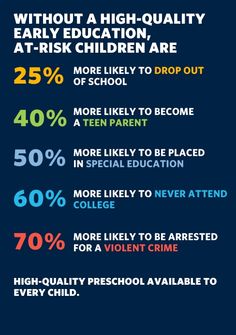Why is Childhood Education Important: Building Strong Foundations.

Childhood education is important because it lays the foundation for lifelong learning and development. It helps children develop social, emotional, and cognitive skills necessary for success in school and life.
Early education also fosters a love for learning, promotes creativity, and builds critical thinking abilities. It provides a structured environment for children to explore and understand the world around them, setting the stage for future academic and personal achievement. Moreover, it can have a positive impact on a child’s overall well-being and future opportunities.
By investing in childhood education, we invest in the future success and prosperity of our society.

Credit: www.waldenu.edu
The Impact Of Early Childhood Education
Early childhood education plays a crucial role in shaping a child’s future. The impact of early childhood education spans across various aspects of a child’s development, including cognitive development and social skills enhancement.
Cognitive Development
Early childhood education significantly impacts a child’s cognitive development. It provides stimulating environments that encourage curiosity and exploration, which are essential for developing strong cognitive skills. Through engaging activities and play-based learning, children can develop their critical thinking, problem-solving, and decision-making abilities, setting a strong foundation for their future academic success.
Social Skills Enhancement
Early childhood education also plays a vital role in enhancing social skills. It provides opportunities for children to interact with their peers and learn important social behaviors such as sharing, cooperation, and empathy. By nurturing these skills from an early age, children can build strong relationships and communication abilities that are crucial for their personal and professional lives.
Benefits Of Quality Early Education Programs
Quality early education programs play a crucial role in shaping a child’s future. These programs provide a strong foundation for a child’s overall development, setting the stage for success in academics, health, and well-being. Let’s explore the specific benefits of quality early education programs in more detail:
Academic Success
Quality early education programs lay the groundwork for a child’s academic success. By introducing early literacy and numeracy skills, children are better prepared to thrive in formal education settings. These programs foster a love for learning and critical thinking skills, which are essential for academic achievement.
Long-term Health And Well-being
Participation in quality early education programs is associated with improved long-term health and well-being. Children who have access to these programs are more likely to adopt healthy lifestyle habits and make better nutrition choices as they grow older. Moreover, these programs can have a positive impact on mental health, promoting resilience and emotional well-being.
Parental Involvement In Early Education
Parental involvement in early education plays a crucial role in shaping a child’s learning and development. It is imperative for parents to actively participate in their child’s educational journey to create a strong foundation for future success.
Role Of Parents In Learning Process
Parents serve as the first and most influential educators in a child’s life. By actively engaging in their child’s learning process, parents can foster a positive attitude towards education and instill a love for learning that will last a lifetime.
Creating Supportive Home Environments
Parents can create supportive home environments by establishing a designated study area, providing access to educational resources, and encouraging open communication about school experiences. This nurturing environment fosters a sense of security and promotes a healthy attitude towards education.

Credit: m.facebook.com
Challenges In Early Childhood Education
Early childhood education is vital for the cognitive, emotional, and social development of young children. However, there are several challenges that hinder the accessibility and quality of early childhood education programs. Addressing these challenges is crucial to ensure that all children have the opportunity to receive a high-quality education that sets the foundation for their future success.
Access To Quality Programs
Access to quality early childhood education programs is a significant challenge, particularly in underserved communities. Limited availability of affordable, high-quality programs often leads to disparities in educational outcomes for children from different socioeconomic backgrounds. Additionally, the lack of resources and funding for early childhood education further exacerbates the issue, making it difficult for families to access programs that provide enriching learning experiences for their children.
Addressing Socioeconomic Disparities
Socioeconomic disparities play a significant role in shaping the early childhood education landscape. Children from low-income families often face barriers to accessing quality programs, which can impact their overall development and academic achievement. Addressing these disparities requires targeted interventions and support systems that provide equitable opportunities for all children to thrive in their early years. By focusing on reducing the gap in access to educational resources, we can create a more inclusive and supportive environment for young learners.
Innovations In Early Education Approaches
Exploring modern methods that enhance childhood education is crucial in shaping the future of our young learners.
Play-based Learning
Play-based learning encourages children to explore, create, and problem-solve in a hands-on environment.
Technology Integration
Integrating technology into early education fosters digital literacy and engagement among children.
Global Perspectives On Early Education
Childhood education is a topic of great importance to parents, educators, and policymakers around the world. It is widely accepted that early education plays a crucial role in shaping a child’s future success and overall well-being. However, the approach to childhood education can vary significantly depending on the country and culture.
Comparison Of Education Systems
When it comes to early education, different countries have different priorities, goals, and methods. For instance, the education system in Finland is often cited as one of the best in the world, with a focus on play-based learning and individualized attention. In contrast, the education system in South Korea is known for its rigorous academic standards and high-pressure environment.
| Country | Education System |
|---|---|
| Finland | Play-based learning, individualized attention |
| South Korea | Rigorous academic standards, high-pressure environment |
Cultural Influences On Learning
Culture can also play a significant role in shaping a child’s educational experience. For example, in Japan, there is a strong emphasis on group harmony and socialization, which can impact the way children are taught and interact with each other. In some African countries, education is seen as a means of escaping poverty and achieving upward mobility, leading to a strong focus on academic achievement.
- Japan: emphasis on group harmony and socialization
- African countries: focus on academic achievement as a means of escaping poverty
Regardless of the approach or cultural context, one thing is clear: early education is critically important for setting children up for success in life. By providing children with a strong foundation in key skills such as literacy, numeracy, and social-emotional development, we can help them reach their full potential and contribute positively to society.
Policy Implications For Early Education
Government funding plays a crucial role in shaping early education policies.
Initiatives such as increased funding for preschool programs benefit children immensely.
Allocating resources equally to all regions can ensure widespread access.
Advocacy for reforms drives improvements in early education standards.
Community involvement enhances support for educational changes.
Collaboration between stakeholders can lead to positive outcomes.
The Future Of Early Childhood Education
Trends In Educational Research
Research indicates the importance of early childhood education for lifelong success.
Embracing Holistic Development
Ensuring a child’s overall growth – physically, emotionally, socially, and cognitively.

Credit: www.linkedin.com
Frequently Asked Questions
How Important Is Childhood Education?
Childhood education is crucial for a child’s development, providing foundational knowledge and skills. It sets the stage for future academic and personal success. Quality early education fosters cognitive, social, and emotional growth, preparing children for lifelong learning and contributing to a well-rounded society.
Why Is It Important To Study Childhood?
Studying childhood is crucial for understanding development and shaping future well-being. It helps identify challenges and create effective interventions for positive outcomes. Understanding childhood also contributes to building supportive environments for children’s growth and learning.
Why Is Early Childhood Education More Important Now Than Ever?
Early childhood education is crucial now due to its lasting impact on a child’s development. It sets a strong foundation for future learning and social skills, preparing them for success in school and beyond.
Why Is It Important To Understand Child Development?
Understanding child development is crucial for providing appropriate care and support, aiding in identifying potential issues early. It helps in creating nurturing environments and promoting healthy growth and development in children.
Conclusion
Ensuring quality childhood education sets the foundation for a child’s future success. It nurtures their skills, creativity, and social development. Investing in early learning yields lifelong benefits. Parents and educators play a crucial role in shaping young minds. Let’s prioritize childhood education for a brighter tomorrow.
Lorem Ipsum is simply dummy text of the printing and typesetting industry. Lorem Ipsum has been the industry’s standard dummy text ever since the 1500s, when an unknown printer took a galley of type and scrambled it to make a type specimen book.






